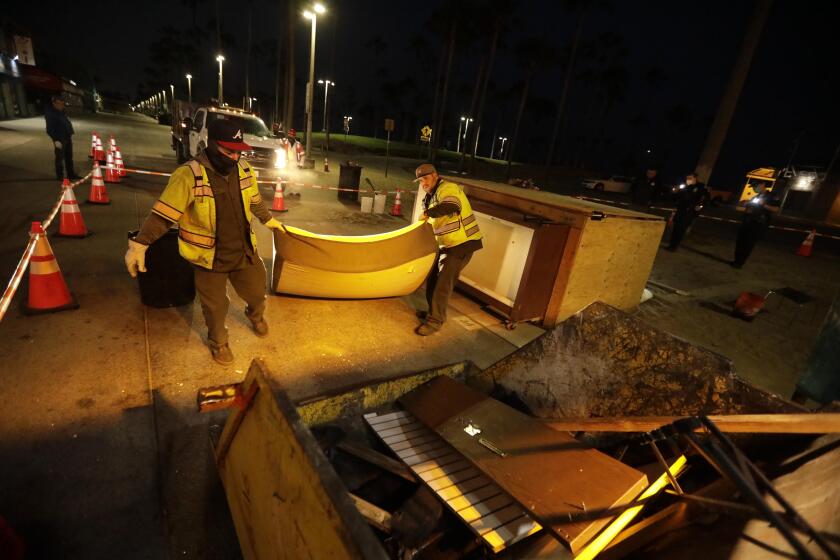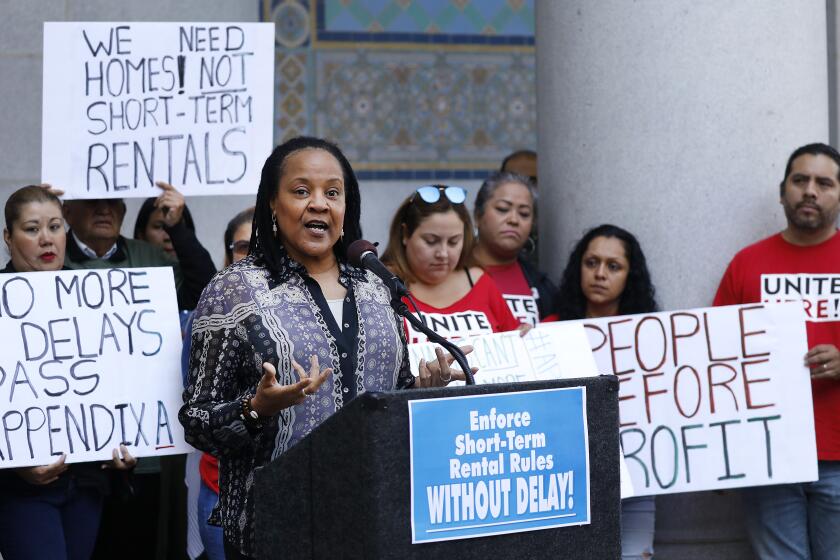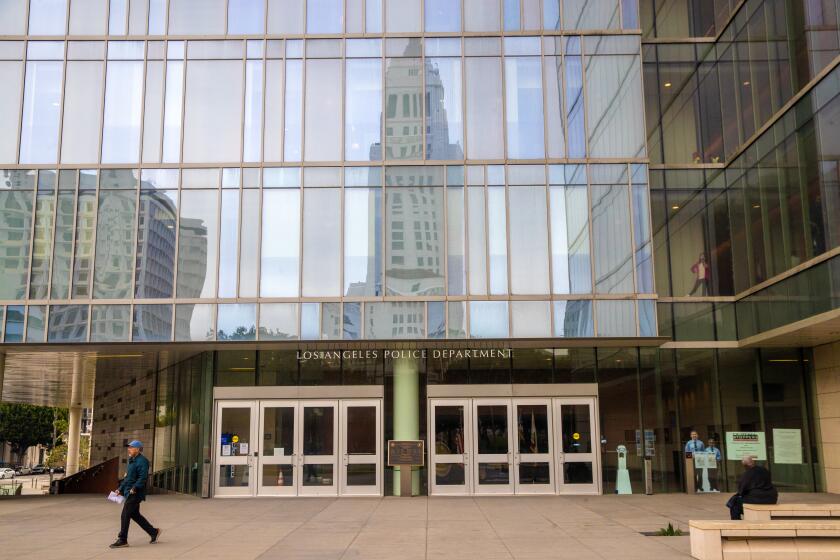Editorial: L.A.’s budget mess means residents could pay more for less service

- Share via
Just months after city leaders negotiated budget-busting pay raises for police officers and civilian employees, Los Angeles’ financial advisors are warning that the city will have to freeze some hiring, cut services, delay construction projects and raise fees over the next year.
None of this should be a surprise to Mayor Karen Bass and City Council members, who understood there would be financial consequences when they backed the pay hikes, knowing the city’s revenue growth was anemic.
In fact, three council members — Eunisses Hernandez, Hugo Soto-Martinez and Nithya Raman — voted against the police contract last summer, arguing the $1-billion cost over four years would drain money from other city services, such as streetlights, sidewalk repairs, building inspections and alternatives to police response. It seems that they were right to be concerned.
Municipal jobs come with good pay, benefits and opportunities for career advancement. But the cumbersome hiring process and up-and-down budget cycles make it harder to attract good candidates to public service.
The choices by the mayor and council mean they now have to dip into the city’s reserve fund, leaving a smaller cash cushion for the next crisis or recession, and make hard choices about what fees to raise and what services to cut to balance the books for the budget starting in July.
It’s unclear yet how this will affect L.A. residents, but City Administrative Officer Matt Szabo has recommended the city eliminate 2,000 vacant positions, which would cut most of the unfilled civilian jobs paid for by the general fund. That would limit the city’s ability to expand programs or shore up services that were already stymied by staff shortages. The cuts could hit agencies that handle city planning, park maintenance, engineering, upkeep of city buildings and youth development, Times reporter David Zahniser wrote in January.
A rushed proposal before the City Council would require that short-term rental hosts get permits from the Los Angeles Police Department, creating another layer of bureaucracy without fixing the flawed enforcement program.
It shouldn’t be this way. For years, city leaders have failed to grapple with the ongoing structural deficit, which is the gap between what the city takes in through taxes and fees and what it pays out, mostly in salaries. They’ve papered over the deficit with temporary gimmicks, such as leaving jobs vacant, postponing repairs and dipping into the reserve fund. The result is that L.A. hasn’t been on stable financial footing long enough to make sustained investments that will ultimately improve city services, such as replacing ancient computer systems, modernizing aging facilities and maintaining and fixing streets and sidewalks.
The civilian contracts, which have Bass’ support and are expected to be approved by the City Council soon, include raises of more than 24% over five years and will likely exceed $100 million in the coming fiscal year that starts July 1. The deal is similar to one approved in 2007 that contributed to the city’s devastating budget crisis during the Great Recession.
For a needed change in the Los Angeles Police Department’s failing discipline system to come before voters this year, the City Council must move faster.
To be sure, the city has to offer competitive pay to attract and retain workers. But it also needs to continue to provide basic services, such as trash collection, street maintenance and public safety. As city leaders grapple with the budget deficit they helped create they must be upfront with workers and residents on what the city can reasonably afford and focus cuts on non-central programs and services — and certainly not enact across-the-board cuts or start new programs until the city is stable financially.
It’s disappointing that Bass’ office downplayed the impact of the cuts and the challenges ahead. “Predictions that city services will be impossible to deliver as a result of not filling already vacant positions, some of which have been vacant for years, are simply false,” Deputy Mayor of Communications Zach Seidl said in a statement. “The City can balance the budget, continue delivering critical services and pay its workers a livable wage.”
But others in City Hall are more pessimistic. The hiring freeze “will mean continued stress on both front-line and support services from Animal Services to Public Works,” City Controller Kenneth Mejia said in letter to the mayor and council. Szabo said last week that balancing the 2024-25 budget “will severely impact department operations and their ability to meet their service delivery goals.” His report also urged city leaders to consider raising fees for trash pickup, sewer service and streetlights to recoup more of the cost from residents.
There are difficult choices ahead. And Bass and the council can’t tiptoe around the fact that their decisions in the past have led to this precarious future — and that L.A. residents are likely to be asked to pay more in fees and get less in services.
More to Read
A cure for the common opinion
Get thought-provoking perspectives with our weekly newsletter.
You may occasionally receive promotional content from the Los Angeles Times.













